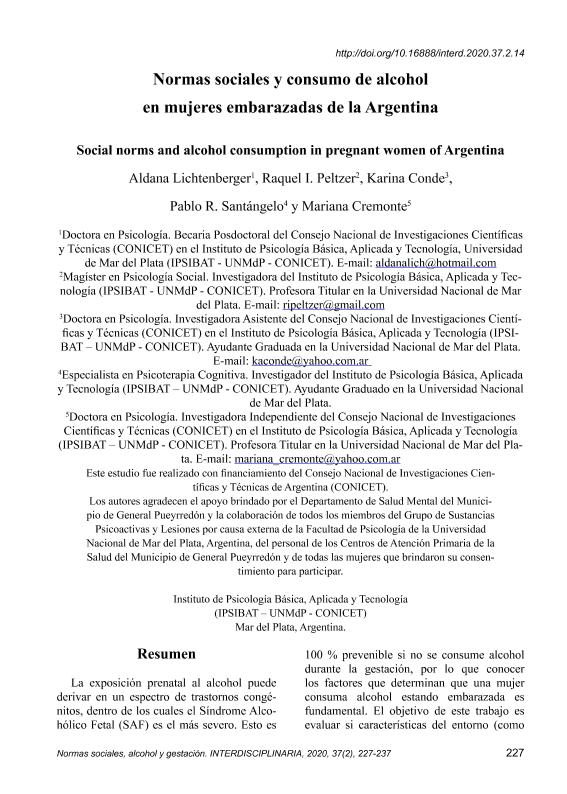Artículo
Introducción: para prevenir las consecuencias de la exposición prenatal al alcohol se deben conocer los factores que determinan que una mujer decida consumir estando embarazada. Es objetivo de este trabajo evaluar características del entorno (las normas sociales percibidas, tanto descriptivas como prescriptivas) y su relación con el consumo de alcohol en mujeres gestantes argentinas. Método: se evaluó el consumo de alcohol antes y durante la gestación y las normas sociales descriptivas y prescriptivas en una muestra probabilística de 852 mujeres embarazadas. Se realizaron análisis descriptivos de las categorías de normas sociales y para describirlas en base al consumo de alcohol se realizaron análisis de clases latentes. Resultados: el 87% de las gestantes considera que otras consumen alcohol y el 90% reconoció que las personas importantes para ellas desaprobarían el consumo. El análisis de clases latentes indicó un mejor ajuste del modelo de dos clases. La Clase 1 estuvo compuesta por mujeres que afirmaron que para las personas de su entorno el consumo de alcohol en el embarazo era aceptable y ellas mismas consumían alcohol en el embarazo. La Clase 2 conglomeró a las mujeres que pensaban que los demás verían como malo su consumo en esta etapa y existió una probabilidad baja de que ellas mismas consumieran durante la gestación. Conclusiones: estos resultados indican que podría ser beneficioso diseñar estrategias preventivas que se focalicen no sólo en la futura madre, sino en el entorno cercano (pareja, familiares, amigos), e incluso en toda la comunidad, donde las normas sociales son establecidas y reproducidas. Prenatal alcohol exposure can lead to a spectrum of congenital disorders for the fetus with permanent consequences, known as fetal alcohol spectrum disorders (FASD), within which Fetal Alcohol Syndrome (SAF) is its most severe extreme. All FASD are 100 % preventable if no alcohol is consumed during pregnancy, so knowing the factors that determine that a woman decides to drink while pregnant is essential to develop effective prevention plans. Among these factors are the phenomena of social influence such as perceived social norms (PSN), both descriptive and prescriptive. The PSN are transmitted by social interaction and produced based on the perception of the beliefs or behaviors of others, beyond their real actions. It has been identified that PSN predict alcohol consumption in various populations, such as university students, but research is almost non-existent with pregnant women. The aim of this study is to assess whether environmental characteristics (such as PSN) are related to alcohol consumption during pregnancy in pregnant women in the city of Mar del Plata, Argentina. Method: a probabilistic sample of 852 pregnant women was carried out during 2016 in the main primary health care centers of the city of Mar del Plata. Alcohol consumption was assessed before and during pregnancy through the AUDIT and the PSN was assessed with five questions constructed ad hoc by specialists in the area of alcohol consumption. Descriptive analyses were performed to categorized social norms and the prescriptive ones were re-categorized into four groups: 1. It is bad for the health of the baby or the mother; 2. It is wrong for cultural or moral reasons; 3. consumption is accepted; 4. It does not know/ does not matter. To describe them based on alcohol consumption, latent class analyses were performed. Models of two to four classes were estimated, reproduced 50 times to avoid local maximums, with the software R. Results: 87 % of pregnant women believed that others in their same condition consume alcohol. 53 % of them believed they consume the same as before pregnancy, 10 % believed they consume more and the rest that they reduced their consumption. The belief about the average amount that other pregnant women would consume is more than three drinks, the equivalent of one bottle of beer per occasion of consumption. 90 % recognized that people important to them would disapprove consumption during pregnancy because doing so would cause harm to the baby, the mother, pregnancy in general or because alcohol is considered harmful to health. 6 % considered that people important to them would approve consumption because few amounts are tolerated or because alcohol is good for breastfeeding. The latent class analysis indicated a better fit for the two-class model. Class 1 was made up of women who claimed that for their people, alcohol consumption during pregnancy was acceptable and they themselves consumed alcohol during pregnancy. Class 2 conglomerated women who thought that others would see their consumption as bad at this stage and there was a low probability that they themselves consumed during pregnancy. Conclusions: These results indicate that it could be beneficial to design preventive strategies that focus not only on the future mother, but on the nearby environment (couple, family, friends), and even throughout the community, where social norms are established and reproduced.
Normas sociales y consumo de alcohol en mujeres embarazadas de la Argentina
Título:
Social norms and alcohol consumption in pregnant women of Argentina
Fecha de publicación:
09/2020
Editorial:
Centro Interamericano de Investigaciones Psicologicas y Ciencias Afines
Revista:
Interdisciplinaria
ISSN:
1668-7027
Idioma:
Español
Tipo de recurso:
Artículo publicado
Clasificación temática:
Resumen
Archivos asociados
Licencia
Identificadores
Colecciones
Articulos(IPSIBAT)
Articulos de INSTITUTO DE PSICOLOGIA BASICA, APLICADA Y TECNOLOGIA
Articulos de INSTITUTO DE PSICOLOGIA BASICA, APLICADA Y TECNOLOGIA
Citación
Lichtenberger, Aldana; Peltzer, Raquel Inés; Conde, Karina Natalia; Cremonte, Mariana; Normas sociales y consumo de alcohol en mujeres embarazadas de la Argentina; Centro Interamericano de Investigaciones Psicologicas y Ciencias Afines; Interdisciplinaria; 37; 2; 9-2020; 227-237
Compartir
Altmétricas




